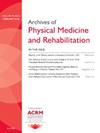Mixed Methods Analysis of Social Support Experiences and Priorities Among Adults with Traumatic Brain Injury 8254
IF 3.6
2区 医学
Q1 REHABILITATION
Archives of physical medicine and rehabilitation
Pub Date : 2025-04-01
DOI:10.1016/j.apmr.2025.01.017
引用次数: 0
Abstract
Objectives
To examine the social support experiences and priorities of community-dwelling adults with chronic traumatic brain injury (TBI).
Design
Convergent parallel mixed methods design with a cross-sectional examination of quantitative data to describe social network size and perceived social support, and qualitative interviews to examine values and priorities related to social support structure and quality.
Setting
Community-based day rehabilitation program.
Participants
Sixteen community-dwelling adults with moderate-severe TBI, >6 months postinjury.
Interventions
None.
Main Outcome Measures
The size of social networks was measured as the number of close social contacts who can be regularly relied upon, and the number of total social contacts. Overall perceived frequency of social support was measured by a transformed total score on MOS Social Support Survey (range, 0-100; higher scores indicate greater support). We also examined subscales on the following MOS Social Support Survey domains: tangible support, emotional and instrumental support, affectionate support, and positive social interaction. Subscale scores are the mean score of the items on each subscale (range, 1-5; higher scores indicate greater support).
Results
Participants had small social networks, which were comprised primarily of family members (mean of 4.3 close social contacts and 8.5 total social contacts). Participants had low perceived frequency of social support (mean, 28.4; SD, 24.7). Their greatest perceived social support was in the tangible support domain (mean, 2.9; SD, 0.8) and the lowest perceived social support was in the affectionate support domains (mean, 1.8; SD, 1.0). The size of the social network and perceived frequency of social support did not align. We identified 3 themes to describe participant values related to the quality of social support: commitment versus indifference, doing things with and for others adds meaning, and “they just love me.”
Conclusions
Although participants had small social networks and low frequency of social support, they did identify several characteristics of social support that contributed to their social support satisfaction. Participants valued people who seemed committed to being there for them, people with whom they share a reciprocal relationship with shared contributions and shared activities, and people who love value them. These priorities align closely with affectionate support and positive social interaction, which are low among people with TBI. These results suggest that rehabilitation interventions should focus on strengthening relationships with close family members and identifying strategies for sustainable, loving, reciprocal relationships within the context of a new TBI.
Disclosures
none.
成人外伤性脑损伤患者社会支持体验及优先级的混合方法分析[j]
目的探讨社区居住成人慢性创伤性脑损伤(TBI)患者的社会支持体验和优先级。设计融合平行混合方法设计与定量数据的横断面检查来描述社会网络的规模和感知的社会支持,和定性访谈来检查价值和优先级相关的社会支持结构和质量。以社区为基础的日间康复计划。参与者:16名在社区居住的中重度脑外伤患者,受伤后6个月。干预措施:主要结果测量社会网络的大小,包括可以经常依赖的亲密社会接触者的数量,以及总社会接触者的数量。社会支持的总体感知频率由MOS社会支持调查的转换总分测量(范围,0-100;分数越高表明支持度越高)。我们还研究了以下MOS社会支持调查领域的子量表:有形支持、情感和工具支持、深情支持和积极的社会互动。子量表得分是每个子量表项目的平均得分(范围,1-5;分数越高表明支持度越高)。结果被试的社交网络较小,主要由家庭成员组成(平均4.3个亲密社会接触者和8.5个总社会接触者)。参与者对社会支持的感知频率较低(平均28.4;SD, 24.7)。他们最大的感知社会支持是在有形支持领域(平均2.9;SD, 0.8),而感知到的社会支持最低的是在情感支持领域(平均1.8;SD, 1.0)。社会网络的大小和感知到的社会支持频率不一致。我们确定了3个主题来描述与社会支持质量相关的参与者价值观:承诺与冷漠,与他人一起做事和为他人做事增加意义,以及“他们就是爱我”。尽管参与者的社会网络较小,社会支持的频率较低,但他们确实确定了社会支持的几个特征,这些特征有助于他们对社会支持的满意度。参与者重视那些似乎承诺会在他们身边的人,那些与他们分享共同贡献和共同活动的互惠关系的人,以及那些爱他们的人。这些优先事项与情感支持和积极的社会互动密切相关,而这些在创伤性脑损伤患者中很低。这些结果表明,康复干预应侧重于加强与亲密家庭成员的关系,并在新的创伤性脑损伤背景下确定可持续、友爱、互惠关系的策略。
本文章由计算机程序翻译,如有差异,请以英文原文为准。
求助全文
约1分钟内获得全文
求助全文
来源期刊
CiteScore
6.20
自引率
4.70%
发文量
495
审稿时长
38 days
期刊介绍:
The Archives of Physical Medicine and Rehabilitation publishes original, peer-reviewed research and clinical reports on important trends and developments in physical medicine and rehabilitation and related fields. This international journal brings researchers and clinicians authoritative information on the therapeutic utilization of physical, behavioral and pharmaceutical agents in providing comprehensive care for individuals with chronic illness and disabilities.
Archives began publication in 1920, publishes monthly, and is the official journal of the American Congress of Rehabilitation Medicine. Its papers are cited more often than any other rehabilitation journal.

 求助内容:
求助内容: 应助结果提醒方式:
应助结果提醒方式:


